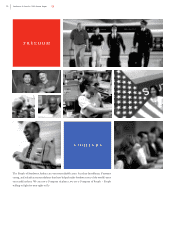Southwest Airlines 2003 Annual Report Download - page 21
Download and view the complete annual report
Please find page 21 of the 2003 Southwest Airlines annual report below. You can navigate through the pages in the report by either clicking on the pages listed below, or by using the keyword search tool below to find specific information within the annual report.Alabama, Arkansas, Kansas, Louisiana, Mississippi, New Mexico, Oklahoma, and Texas if (a) "such air
carrier does not offer or provide any through service or ticketing with another air carrier" and (b) "such air
carrier does not offer for sale transportation to or from, and the flight or aircraft does not serve, any point
which is outside any such states." The Wright Amendment does not restrict flights operated with aircraft
having 56 or fewer passenger seats. The Wright Amendment does not restrict Southwest's intrastate Texas
flights or its air service from points other than Love Field.
The Department of Transportation (“DOT”) has significant regulatory jurisdiction over passenger
airlines. Unless exempted, no air carrier may furnish air transportation over any route without a DOT
certificate of public convenience and necessity, which does not confer either exclusive or proprietary rights.
The Company's certificates are unlimited in duration and permit the Company to operate among any points
within the United States, its territories and possessions, except as limited by the Wright Amendment, as do
the certificates of all other U.S. carriers. DOT may revoke such certificates, in whole or in part, for
intentional failure to comply with certain provisions of the U.S. Transportation Code, or any order or
regulation issued thereunder or any term of such certificate; provided that, with respect to revocation, the
certificate holder has first been advised of the alleged violation and fails to comply after being given a
reasonable time to do so.
DOT prescribes uniform disclosure standards regarding terms and conditions of carriage and
prescribes that terms incorporated into the Contract of Carriage by reference are not binding upon passengers
unless notice is given in accordance with its regulations.
Safety. The Company and its third-party maintenance providers are subject to the jurisdiction of the
Federal Aviation Administration (“FAA”) with respect to its aircraft maintenance and operations, including
equipment, ground facilities, dispatch, communications, flight training personnel, and other matters affecting
air safety. To ensure compliance with its regulations, the FAA requires airlines to obtain operating,
airworthiness, and other certificates, which are subject to suspension or revocation for cause. The Company
has obtained such certificates. The FAA, acting through its own powers or through the appropriate U. S.
Attorney, also has the power to bring proceedings for the imposition and collection of fines for violation of
the Federal Air Regulations.
The Company is subject to various other federal, state, and local laws and regulations relating to
occupational safety and health, including Occupational Safety and Health Administration (OSHA) and Food
and Drug Administration (FDA) regulations.
Security. On November 19, 2001, President Bush signed into law the Aviation and Transportation
Security Act (“Security Act”). The Security Act generally provides for enhanced aviation security measures.
The Security Act established a new Transportation Security Administration (“TSA”), which has recently
been moved to the new Department of Homeland Security. The TSA assumed the aviation security functions
previously residing in the FAA and assumed passenger screening contracts at U.S. airports on February 17,
2002. The TSA now provides for the screening of all passengers and property, which is performed by
federal employees. Beginning February 1, 2002, a $2.50 per enplanement security fee is imposed on
passengers (maximum of $5.00 per one-way trip). This fee was suspended by Congress from June 1 through
September 30, 2003. Pursuant to authority granted to the TSA to impose additional fees on air carriers if
necessary to cover additional federal aviation security costs, the TSA has imposed an annual Security
Infrastructure Fee, which approximated $23 million for Southwest in 2002 and $18 million in 2003. This fee
was also suspended by Congress from June 1 through September 30, 2003. Like the FAA, the TSA may
impose and collect fines for violations of its regulations.
Enhanced security measures have had, and will continue to have, a significant impact on the airport
experience for passengers. While these security requirements have not impacted aircraft utilization, they have
impacted our business. The Company has invested significantly in facilities, equipment, and technology to
process Customers efficiently and restore the airport experience. The Company has implemented its
























